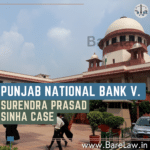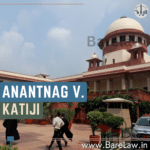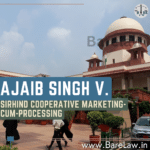
Table of Contents
Muhammad Raza v. Abbas Bandi Bibi (1932) | BareLaw
Muhammad Raza v. Abbas Bandi Bibi (1932)is an important case in the law of property, especially concerning legal restrictions on transferability of property. It stands out for its discussion on conditions attached to transfers of property that limit them either to specific persons or duration.
Introduction:
This is a historical Indian property law case, Muhammad Raza v. Abbas Bandi Bibi 1932; its main focus lies in the sphere of testamentary freedom and limitations on the alienability of properties. This paper presents the facts of this suit, legal questions it raised and implications for real estate in pronouncing its judgment.
Background and Facts:
The origin of this case dated back to a compromise agreement signed by Sughra Bibi with Afzal Husain at Oudh in India way back in 19th century over ownership of properties. The terms in question formed part of a matrimonial settlement whereby no stranger could become owner thereof; but they must remain within their family members passing from one generation to another.
Legal Issues:
The central issue was whether the condition restricting transfer outside the family was valid. The present case examined the legality of limitations against alienation specifically provided for by law including those limiting alienations upto certain individuals or for specified periods.
Judicial Observations and Decision:
In its final decision, the court found that such conditionalities like those imposing time limits or persons were null and void. On this point, it was also held by the Court that although restraint upon alienation may be partial yet it has been impliedly laid down that partial restraints are valid if not absolute.
Implications of the Judgment:
Muhammad Raza v. Abbas Bandi Bibi is very special law suit regarding Transfer of Property Act among others pertaining to land right matters . It clarified that absolute restraints cannot be imposed on transfers while only partial ones can be allowed such as non-family transfers do not amount to restraints on alienation. This is an important case for understanding the line between testamentary freedom and property rights framework.
Conclusion:
One of the most important cases in property law is Muhammad Raza v. Abbas Bandi Bibi. It serves as a good illustration of how to weigh personal freedom of choice in relation to property disposition against legal principles of ownership rights. The case is essential for purposes of determining some aspects relating to restrictions on transfers under the Transfer of Property Act and therefore must be studied deeply





